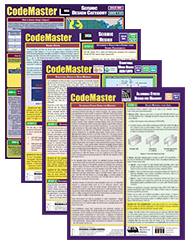CodeMaster Bundle: 2018 IBC
This collection of CodeMaster laminated reference guides will aid you in preparation for your exam and will come in handy both on the exam and in your real world experience. All four guides are in accordance with the 2018 IBC and ASCE 7-16 or ASDCM18. Each guide provides illustrations for clarity on codes described and solved examples make it easy to understand the information presented.
This Bundle Includes:
- CodeMaster - Allowable Stress Design for Masonry (2018 IBC) (ASDCM18)
- CodeMaster - Structural Wood Design ASD/LRFD (2018 IBC, ASCE 7-16, 2018 NDS)
- CodeMaster - Seismic Design Category (2018 IBC / ASCE 7-16)
- CodeMaster - Seismic Design (2018 IBC / ASCE 7-16)
FAQs
Some states require a BS degree from an ABET-accredited engineering program to sit for the PE exam. Other states allow you to take the PE exam with a degree in engineering technology, physics, math, or chemistry—or without any degree—as long as you’ve met the required work experience. Check your state requirements to see if you can take the PE exam without an engineering degree.
Most states allow you to take the PE exam after passing your FE exam and gaining at least four years of post-college work experience. However, some states now allow examinees to sit for the PE exam before completing their work experience. Check your state requirements to see when you’re qualified to sit for the exam.
The PE exams are not considered easy to pass, but the exam will become easier if the content reflects topics that you're familiar with from your current line of work. Think about your career goals when considering the PE exam. Are you seeking a promotion in your current role? You should select the exam that best supports your current career. Are you trying to switch industries? Choose the exam that will set you up for success in your new field. Rather than seek out the easiest PE exam, select the one that will support your goals.
